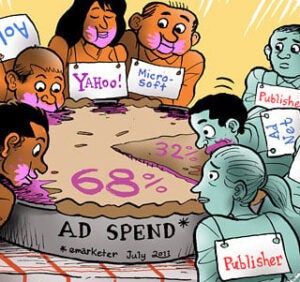 RocketFuel announced that it is partnering with Dynamic Logic for its new Real Time Brand Optimzation solution which “optimizes the targeting of [brand marketer’s] campaigns based on familiar characteristics such as being in-market for a product or being favorable towards it.” Read the release.
RocketFuel announced that it is partnering with Dynamic Logic for its new Real Time Brand Optimzation solution which “optimizes the targeting of [brand marketer’s] campaigns based on familiar characteristics such as being in-market for a product or being favorable towards it.” Read the release.
Richard Frankel, president of Rocket Fuel Inc. discussed the Dynamic Logic integration and challenges for brand marketers today.
AdExchanger.com: A Dynamic Logic study used in coordination with an ad network is nothing new. How is this different than how advertisers use DL studies to inform their audience targeting tactics?
RF: The new Rocket Fuel/Dynamic Logic brand optimization program is not a research program like previous Dynamic Logic products, and doesn’t replace them. Instead, it is a targeting product that leverages in-banner DL studies to allow us to optimize brand campaigns against the kinds of audience characteristics — such as awareness, favorability, or purchase intent — that brand advertisers are used to measuring with studies. These characteristics are fed into Rocket Fuel’s optimization engine in real-time and used to optimize campaigns on the fly to improve overall targeting performance — based on brand-oriented characteristics — as the campaign is running. This is a huge new capability that is entirely new for brand advertisers. Traditional DL studies are meant to be deep research programs that are part of a long-term effort by advertisers to understand their campaign performance.
What are your thoughts on the nature of “real-time” as it relates to brand awareness data? Is there a short shelf life?
The question for any campaign — brand or otherwise — is how quickly advertisers can use audience data to make informed decisions about improving their campaigns. Consumer’s responses to ads — whether it’s increased awareness, favorability, or a direct response — fluctuate all the time as their experience and interests change. So now that it is possible for advertisers to use brand interests and related audience characteristics to improve their targeting on the fly, advertisers can better participate in consumers’ ongoing ad experience.
How is Rocket Fuel approaching attribution modeling for brand campaigns looking to raise brand awareness? And, what are some of the attributes that RF points to in order to help the marketer understand the ROI of its online ad campaigns through Rocket Fuel?
Savvy digital marketers are moving away from inaccurate attribution modeling and more toward direct attribution assessment using test and control methodologies. This type of attribution evaluation can be done by Rocket Fuel, Dynamic Logic and others who use test/control methods. Our new partnership and system helps advertisers deliver ads that are more relevant to their target audience. And as many brand-oriented campaigns will be focused on targeting effectiveness – meaning, making sure that we’re showing ads to the right target audience — we will be measuring all along if we’re hitting the right target and adjusting on the fly to increase the efficiency of the campaign. Our ongoing in-banner surveys will continue to validate that we’re turning in the right direction. As brand marketers layer on direct ROI measurement, this will be managed by companies like Dynamic Logic using tests and controls that directly estimate attribution instead of trying to guess at it.
By John Ebbert












